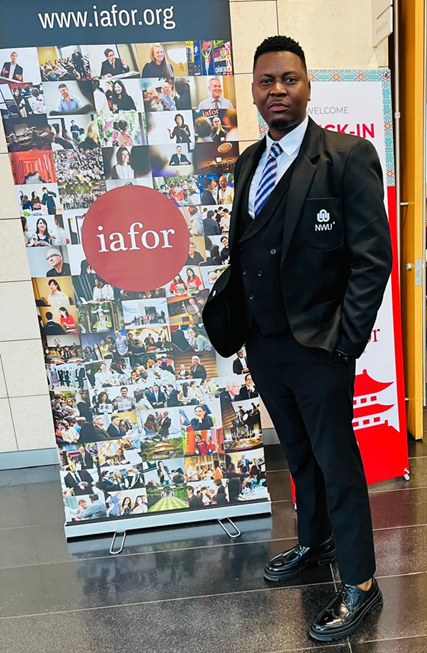Kamogelo Noge, a Master of Indigenous Knowledge Systems (MIKS) student at the North-West University (NWU) Mahikeng Campus, recently embarked on an educational journey to the industrial city of Incheon in South Korea.
Noge was honoured to partake in the Korean Conference on Education, which ran from Monday, 28 October to Friday, 1 November at the Songdo Convensia – an international exhibition and convention centre.
The International Academic Forum (IAFOR) Research Centre at the Osaka School of International Public Policy (OSIPP) at the Osaka University in Japan, the Incheon Global Campus, and the University of Utah’s Asia Campus collaborated to host the conference.
In addition to providing the participants with a remarkable chance to network, the conference facilitated cross-disciplinary and cross-national interactions and promoted intellectual understanding.
“It was a positive experience, and since I have attended only national conferences, the goal was to understand how international conferences function,” said Noge on participating in this prestigious conference. He added: “Because I was presenting new material from an African indigenous perspective, the audience was attentive and cooperative during my presentation. It was a great exchange of ideas, and I felt honoured to be the only postgraduate student on the panel with professors and doctors.”
Kamogelo was given the task to give a presentation on the subject of challenging and preserving culture, inter/multiculturalism, and languages. On Thursday, 31 October, he gave an informative address about the preservation of indigenous languages and culture in the context of multiculturalism.
Noge elaborated on the significance of his presentation, saying: “Indigenous languages and culture should be mainstreamed within the current contemporary education. The safeguarding of culture and indigenous languages in a multicultural setting is key to fostering the regeneration of one’s identity.”
He expressed the view that research and publications should be at the centre of protecting culture and language in documentation. “Indigenous pedagogical approaches are important for teaching and learning to embrace the continuation of culture and indigenous languages at institutions of higher learning.”
Throughout his presentation, Noge emphasised how African indigenous scholars elaborate on indigenous concepts in their research and how they collect and analyse data. He further explained how African individuals view their culture and use their languages through African indigenous life skills education.
Kamogelo underlined the importance of language policies in higher education, saying those who have the desire to conduct research in their mother tongues should be given priority.
He remarked on the wealth of knowledge he had acquired at the conference and said participants were urged to stand up for their own research and cultures. Noge further stressed that the conference conveners were welcoming and encouraged attendees to exchange contact details in order to invite each other to their respective countries.
Further, there was a plenary session at the conference where attendees shared their perspectives on several national issues. These national troubles stretched from corruption, language barriers, frameworks built in education systems, research difficulties and leadership ethics to institutional systems affecting students and solutions to combat these concerns.

Master of Indigenous Knowledge Systems student Kamogelo Noge at the education conference in Incheon, South Korea.
